Pluralism in Economics: Advantages and Disadvantages Explored
VerifiedAdded on 2020/05/11
|7
|1487
|67
Essay
AI Summary
This essay explores the significance of pluralism in economic decision-making, focusing on game theory and experimental economics. It delves into the advantages of game theory, such as providing a normative perspective and offering optimal solutions, and experimental economics, which offers a positivistic view and control over variables. The essay then critiques the disadvantages of both methods, including their reliance on perfectly rational behavior and the challenges of generalizability. It addresses a research question regarding the alignment of agents and principals in a corporate context, demonstrating how game theory and experimental approaches can be applied. Ultimately, the essay concludes that both game theory and experimental economics contribute substantially to economic analysis, while acknowledging their respective limitations in real-world application, particularly in the face of bounded rationality and complex interacting variables.
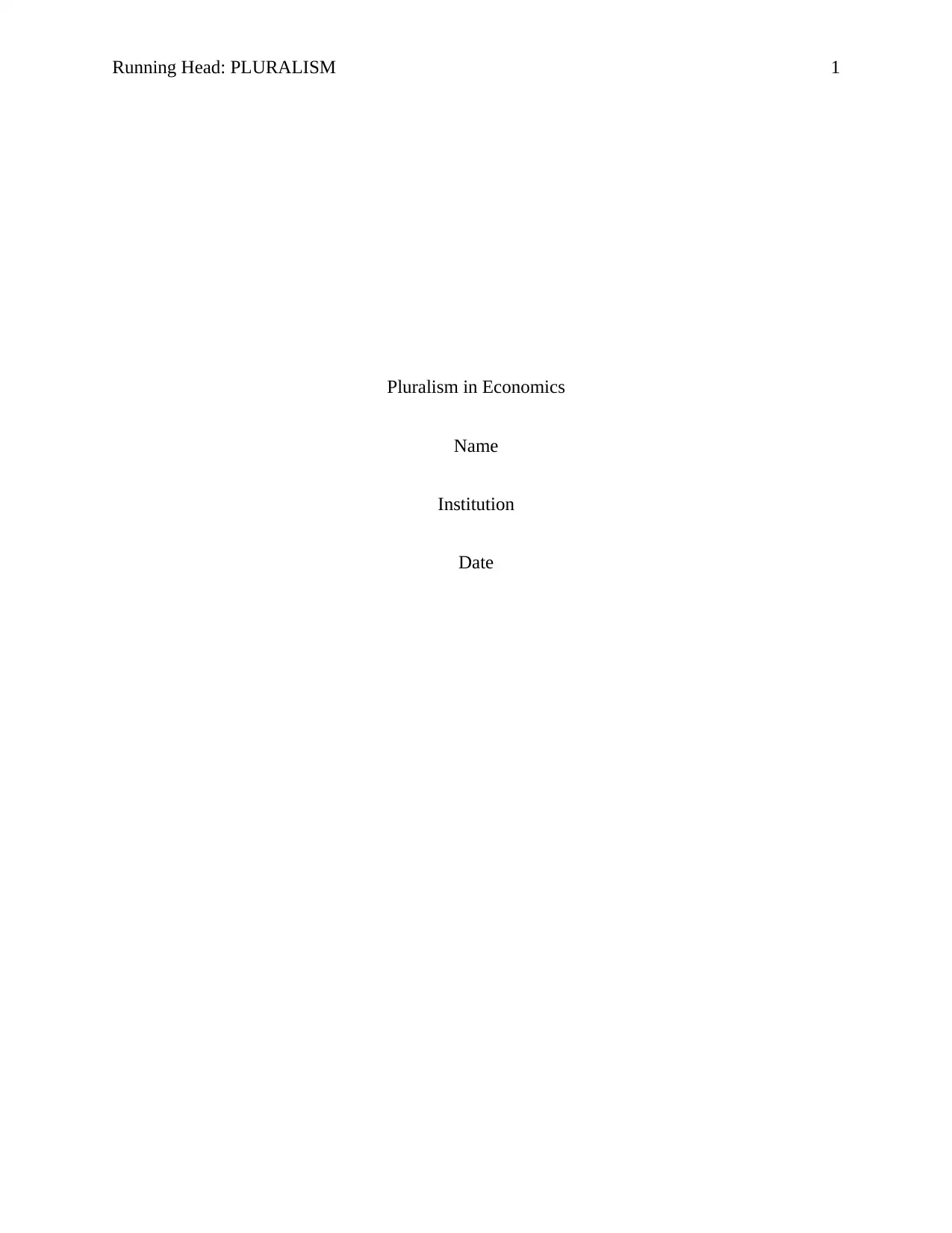
Running Head: PLURALISM 1
Pluralism in Economics
Name
Institution
Date
Pluralism in Economics
Name
Institution
Date
Paraphrase This Document
Need a fresh take? Get an instant paraphrase of this document with our AI Paraphraser
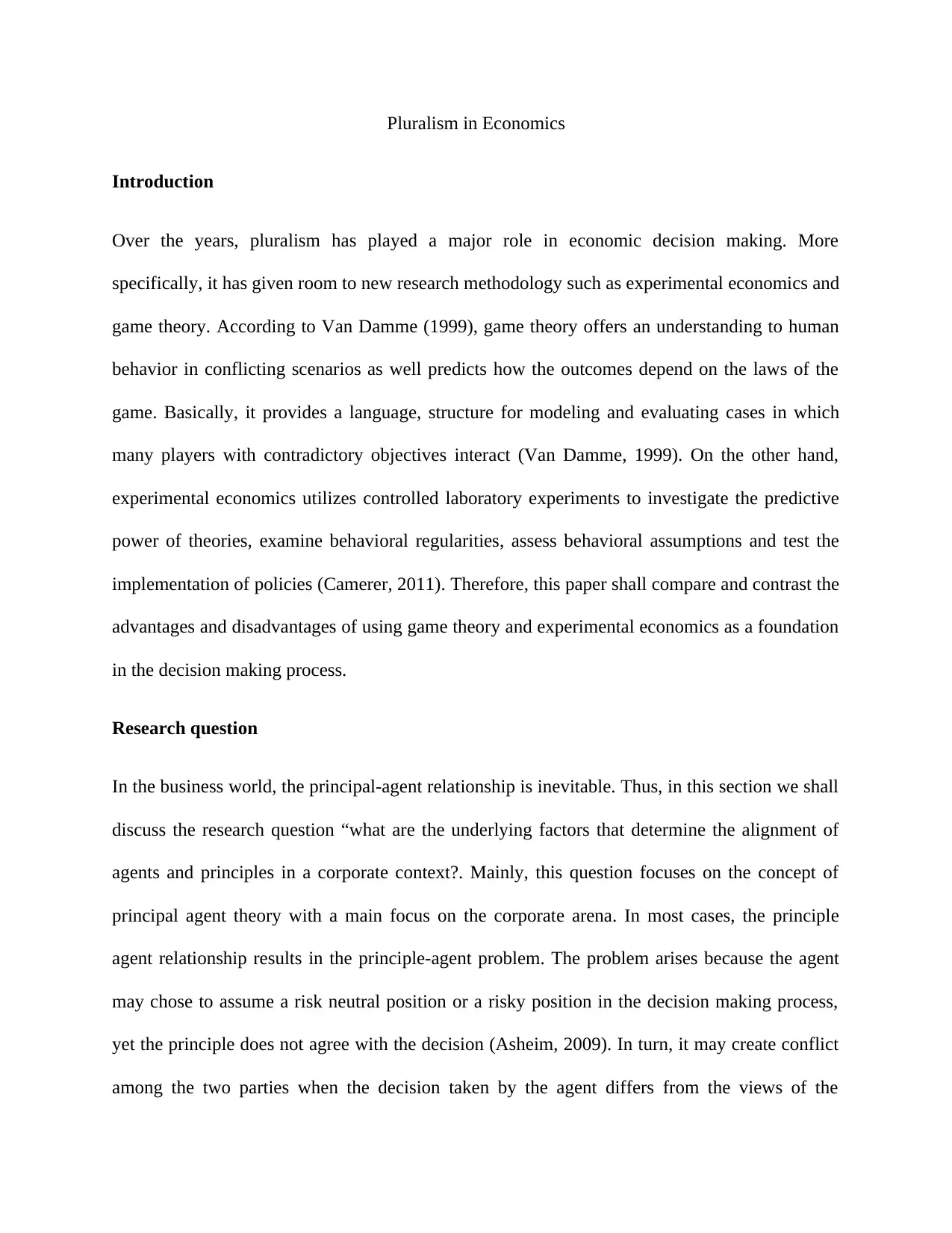
Pluralism in Economics
Introduction
Over the years, pluralism has played a major role in economic decision making. More
specifically, it has given room to new research methodology such as experimental economics and
game theory. According to Van Damme (1999), game theory offers an understanding to human
behavior in conflicting scenarios as well predicts how the outcomes depend on the laws of the
game. Basically, it provides a language, structure for modeling and evaluating cases in which
many players with contradictory objectives interact (Van Damme, 1999). On the other hand,
experimental economics utilizes controlled laboratory experiments to investigate the predictive
power of theories, examine behavioral regularities, assess behavioral assumptions and test the
implementation of policies (Camerer, 2011). Therefore, this paper shall compare and contrast the
advantages and disadvantages of using game theory and experimental economics as a foundation
in the decision making process.
Research question
In the business world, the principal-agent relationship is inevitable. Thus, in this section we shall
discuss the research question “what are the underlying factors that determine the alignment of
agents and principles in a corporate context?. Mainly, this question focuses on the concept of
principal agent theory with a main focus on the corporate arena. In most cases, the principle
agent relationship results in the principle-agent problem. The problem arises because the agent
may chose to assume a risk neutral position or a risky position in the decision making process,
yet the principle does not agree with the decision (Asheim, 2009). In turn, it may create conflict
among the two parties when the decision taken by the agent differs from the views of the
Introduction
Over the years, pluralism has played a major role in economic decision making. More
specifically, it has given room to new research methodology such as experimental economics and
game theory. According to Van Damme (1999), game theory offers an understanding to human
behavior in conflicting scenarios as well predicts how the outcomes depend on the laws of the
game. Basically, it provides a language, structure for modeling and evaluating cases in which
many players with contradictory objectives interact (Van Damme, 1999). On the other hand,
experimental economics utilizes controlled laboratory experiments to investigate the predictive
power of theories, examine behavioral regularities, assess behavioral assumptions and test the
implementation of policies (Camerer, 2011). Therefore, this paper shall compare and contrast the
advantages and disadvantages of using game theory and experimental economics as a foundation
in the decision making process.
Research question
In the business world, the principal-agent relationship is inevitable. Thus, in this section we shall
discuss the research question “what are the underlying factors that determine the alignment of
agents and principles in a corporate context?. Mainly, this question focuses on the concept of
principal agent theory with a main focus on the corporate arena. In most cases, the principle
agent relationship results in the principle-agent problem. The problem arises because the agent
may chose to assume a risk neutral position or a risky position in the decision making process,
yet the principle does not agree with the decision (Asheim, 2009). In turn, it may create conflict
among the two parties when the decision taken by the agent differs from the views of the
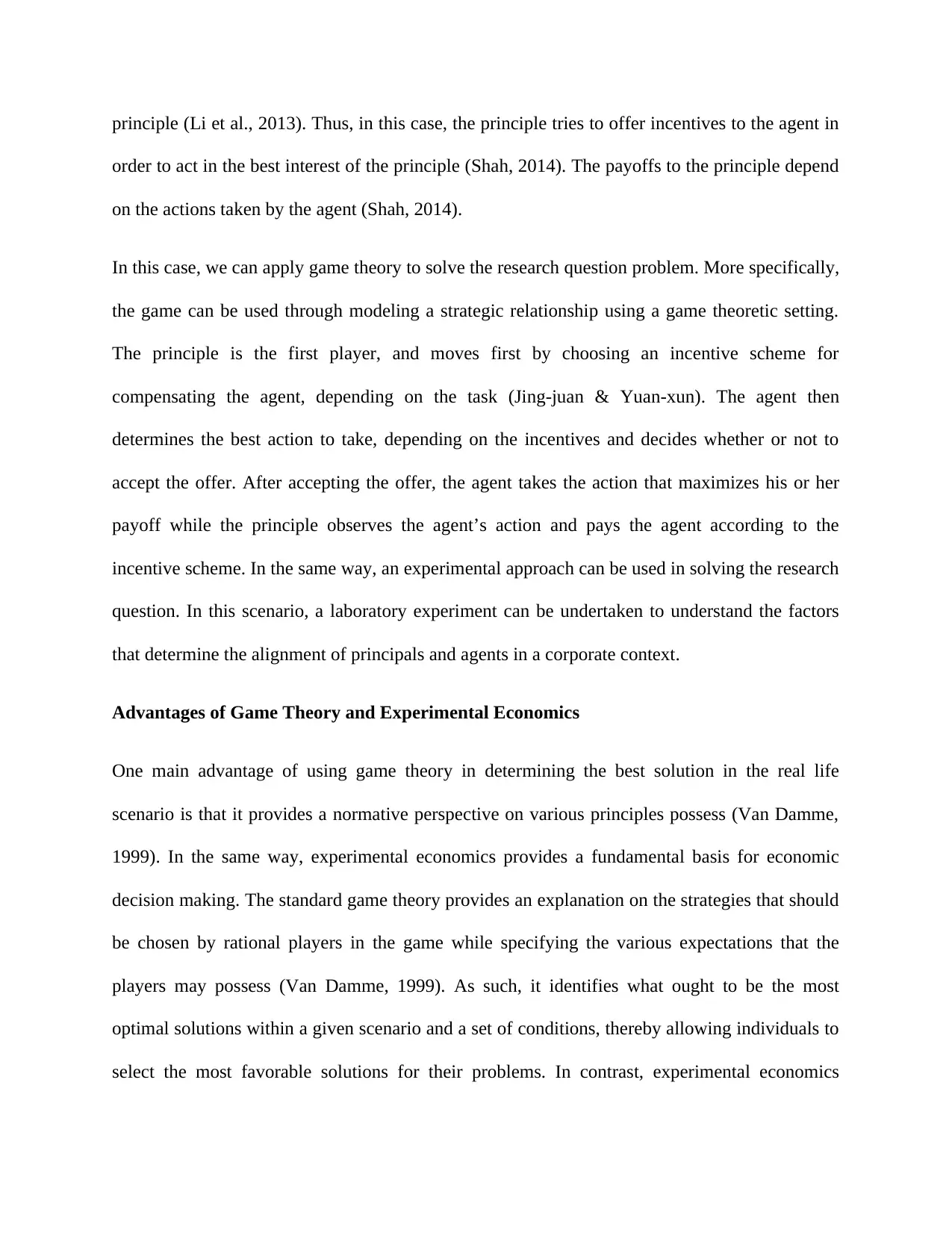
principle (Li et al., 2013). Thus, in this case, the principle tries to offer incentives to the agent in
order to act in the best interest of the principle (Shah, 2014). The payoffs to the principle depend
on the actions taken by the agent (Shah, 2014).
In this case, we can apply game theory to solve the research question problem. More specifically,
the game can be used through modeling a strategic relationship using a game theoretic setting.
The principle is the first player, and moves first by choosing an incentive scheme for
compensating the agent, depending on the task (Jing-juan & Yuan-xun). The agent then
determines the best action to take, depending on the incentives and decides whether or not to
accept the offer. After accepting the offer, the agent takes the action that maximizes his or her
payoff while the principle observes the agent’s action and pays the agent according to the
incentive scheme. In the same way, an experimental approach can be used in solving the research
question. In this scenario, a laboratory experiment can be undertaken to understand the factors
that determine the alignment of principals and agents in a corporate context.
Advantages of Game Theory and Experimental Economics
One main advantage of using game theory in determining the best solution in the real life
scenario is that it provides a normative perspective on various principles possess (Van Damme,
1999). In the same way, experimental economics provides a fundamental basis for economic
decision making. The standard game theory provides an explanation on the strategies that should
be chosen by rational players in the game while specifying the various expectations that the
players may possess (Van Damme, 1999). As such, it identifies what ought to be the most
optimal solutions within a given scenario and a set of conditions, thereby allowing individuals to
select the most favorable solutions for their problems. In contrast, experimental economics
order to act in the best interest of the principle (Shah, 2014). The payoffs to the principle depend
on the actions taken by the agent (Shah, 2014).
In this case, we can apply game theory to solve the research question problem. More specifically,
the game can be used through modeling a strategic relationship using a game theoretic setting.
The principle is the first player, and moves first by choosing an incentive scheme for
compensating the agent, depending on the task (Jing-juan & Yuan-xun). The agent then
determines the best action to take, depending on the incentives and decides whether or not to
accept the offer. After accepting the offer, the agent takes the action that maximizes his or her
payoff while the principle observes the agent’s action and pays the agent according to the
incentive scheme. In the same way, an experimental approach can be used in solving the research
question. In this scenario, a laboratory experiment can be undertaken to understand the factors
that determine the alignment of principals and agents in a corporate context.
Advantages of Game Theory and Experimental Economics
One main advantage of using game theory in determining the best solution in the real life
scenario is that it provides a normative perspective on various principles possess (Van Damme,
1999). In the same way, experimental economics provides a fundamental basis for economic
decision making. The standard game theory provides an explanation on the strategies that should
be chosen by rational players in the game while specifying the various expectations that the
players may possess (Van Damme, 1999). As such, it identifies what ought to be the most
optimal solutions within a given scenario and a set of conditions, thereby allowing individuals to
select the most favorable solutions for their problems. In contrast, experimental economics
⊘ This is a preview!⊘
Do you want full access?
Subscribe today to unlock all pages.

Trusted by 1+ million students worldwide
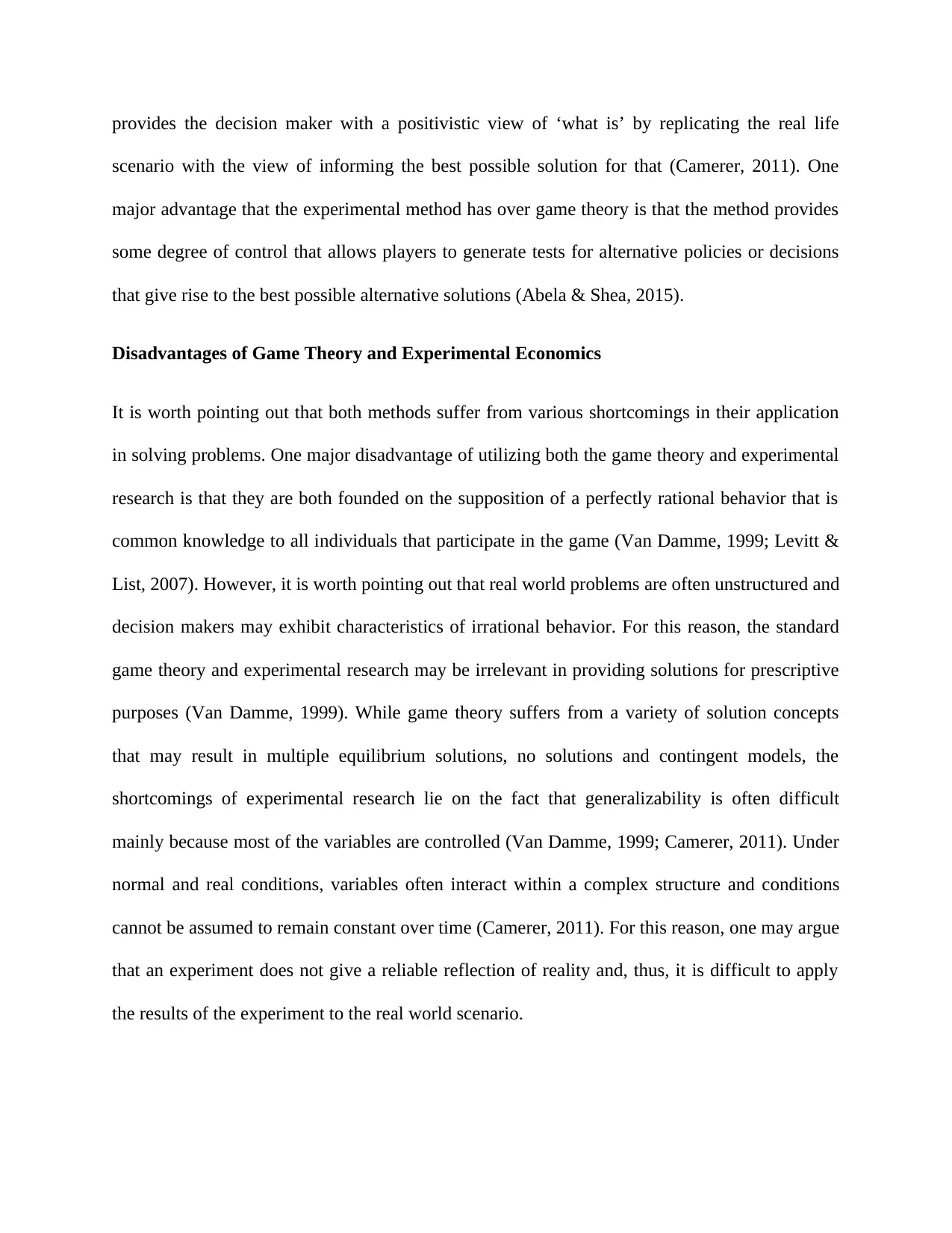
provides the decision maker with a positivistic view of ‘what is’ by replicating the real life
scenario with the view of informing the best possible solution for that (Camerer, 2011). One
major advantage that the experimental method has over game theory is that the method provides
some degree of control that allows players to generate tests for alternative policies or decisions
that give rise to the best possible alternative solutions (Abela & Shea, 2015).
Disadvantages of Game Theory and Experimental Economics
It is worth pointing out that both methods suffer from various shortcomings in their application
in solving problems. One major disadvantage of utilizing both the game theory and experimental
research is that they are both founded on the supposition of a perfectly rational behavior that is
common knowledge to all individuals that participate in the game (Van Damme, 1999; Levitt &
List, 2007). However, it is worth pointing out that real world problems are often unstructured and
decision makers may exhibit characteristics of irrational behavior. For this reason, the standard
game theory and experimental research may be irrelevant in providing solutions for prescriptive
purposes (Van Damme, 1999). While game theory suffers from a variety of solution concepts
that may result in multiple equilibrium solutions, no solutions and contingent models, the
shortcomings of experimental research lie on the fact that generalizability is often difficult
mainly because most of the variables are controlled (Van Damme, 1999; Camerer, 2011). Under
normal and real conditions, variables often interact within a complex structure and conditions
cannot be assumed to remain constant over time (Camerer, 2011). For this reason, one may argue
that an experiment does not give a reliable reflection of reality and, thus, it is difficult to apply
the results of the experiment to the real world scenario.
scenario with the view of informing the best possible solution for that (Camerer, 2011). One
major advantage that the experimental method has over game theory is that the method provides
some degree of control that allows players to generate tests for alternative policies or decisions
that give rise to the best possible alternative solutions (Abela & Shea, 2015).
Disadvantages of Game Theory and Experimental Economics
It is worth pointing out that both methods suffer from various shortcomings in their application
in solving problems. One major disadvantage of utilizing both the game theory and experimental
research is that they are both founded on the supposition of a perfectly rational behavior that is
common knowledge to all individuals that participate in the game (Van Damme, 1999; Levitt &
List, 2007). However, it is worth pointing out that real world problems are often unstructured and
decision makers may exhibit characteristics of irrational behavior. For this reason, the standard
game theory and experimental research may be irrelevant in providing solutions for prescriptive
purposes (Van Damme, 1999). While game theory suffers from a variety of solution concepts
that may result in multiple equilibrium solutions, no solutions and contingent models, the
shortcomings of experimental research lie on the fact that generalizability is often difficult
mainly because most of the variables are controlled (Van Damme, 1999; Camerer, 2011). Under
normal and real conditions, variables often interact within a complex structure and conditions
cannot be assumed to remain constant over time (Camerer, 2011). For this reason, one may argue
that an experiment does not give a reliable reflection of reality and, thus, it is difficult to apply
the results of the experiment to the real world scenario.
Paraphrase This Document
Need a fresh take? Get an instant paraphrase of this document with our AI Paraphraser
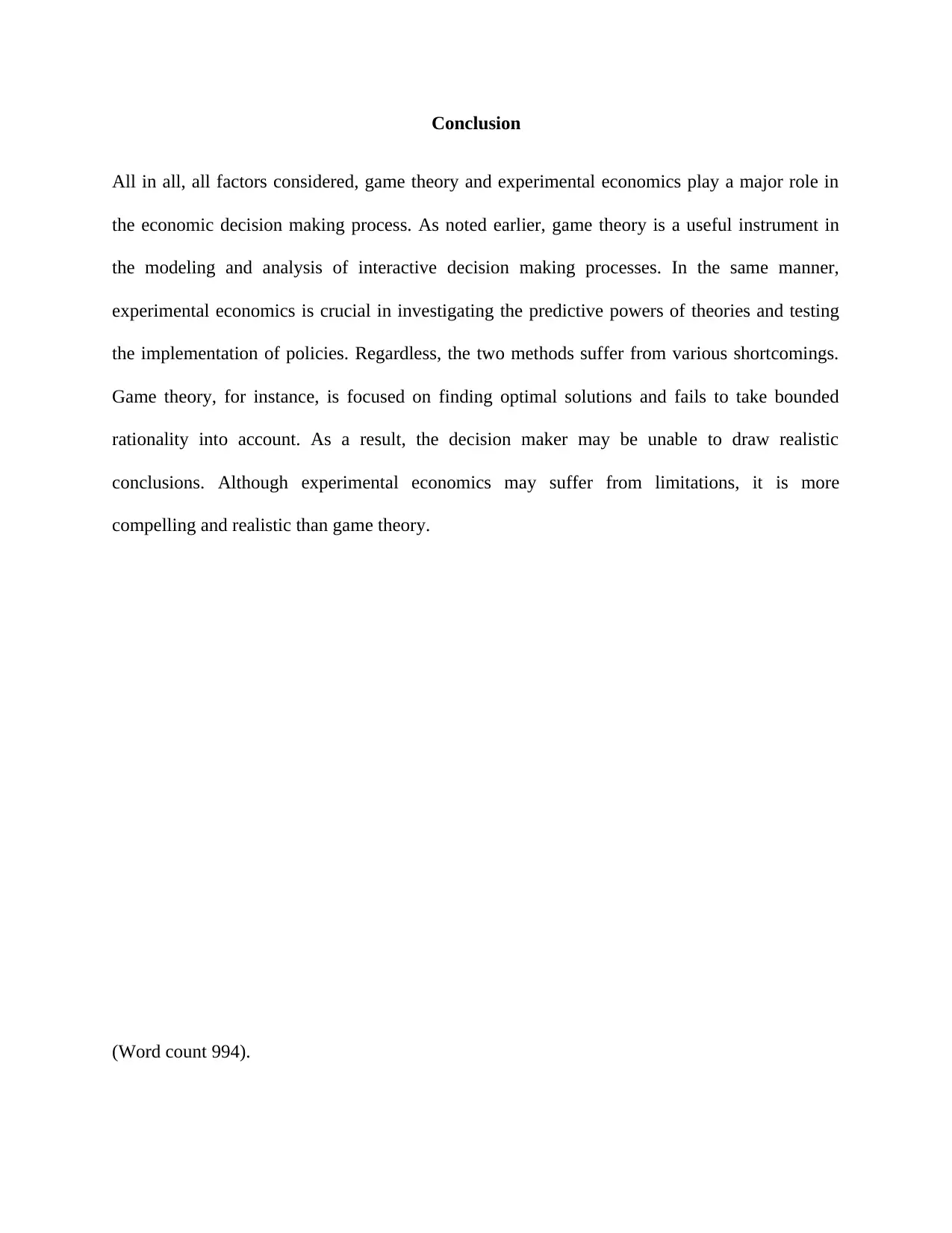
Conclusion
All in all, all factors considered, game theory and experimental economics play a major role in
the economic decision making process. As noted earlier, game theory is a useful instrument in
the modeling and analysis of interactive decision making processes. In the same manner,
experimental economics is crucial in investigating the predictive powers of theories and testing
the implementation of policies. Regardless, the two methods suffer from various shortcomings.
Game theory, for instance, is focused on finding optimal solutions and fails to take bounded
rationality into account. As a result, the decision maker may be unable to draw realistic
conclusions. Although experimental economics may suffer from limitations, it is more
compelling and realistic than game theory.
(Word count 994).
All in all, all factors considered, game theory and experimental economics play a major role in
the economic decision making process. As noted earlier, game theory is a useful instrument in
the modeling and analysis of interactive decision making processes. In the same manner,
experimental economics is crucial in investigating the predictive powers of theories and testing
the implementation of policies. Regardless, the two methods suffer from various shortcomings.
Game theory, for instance, is focused on finding optimal solutions and fails to take bounded
rationality into account. As a result, the decision maker may be unable to draw realistic
conclusions. Although experimental economics may suffer from limitations, it is more
compelling and realistic than game theory.
(Word count 994).
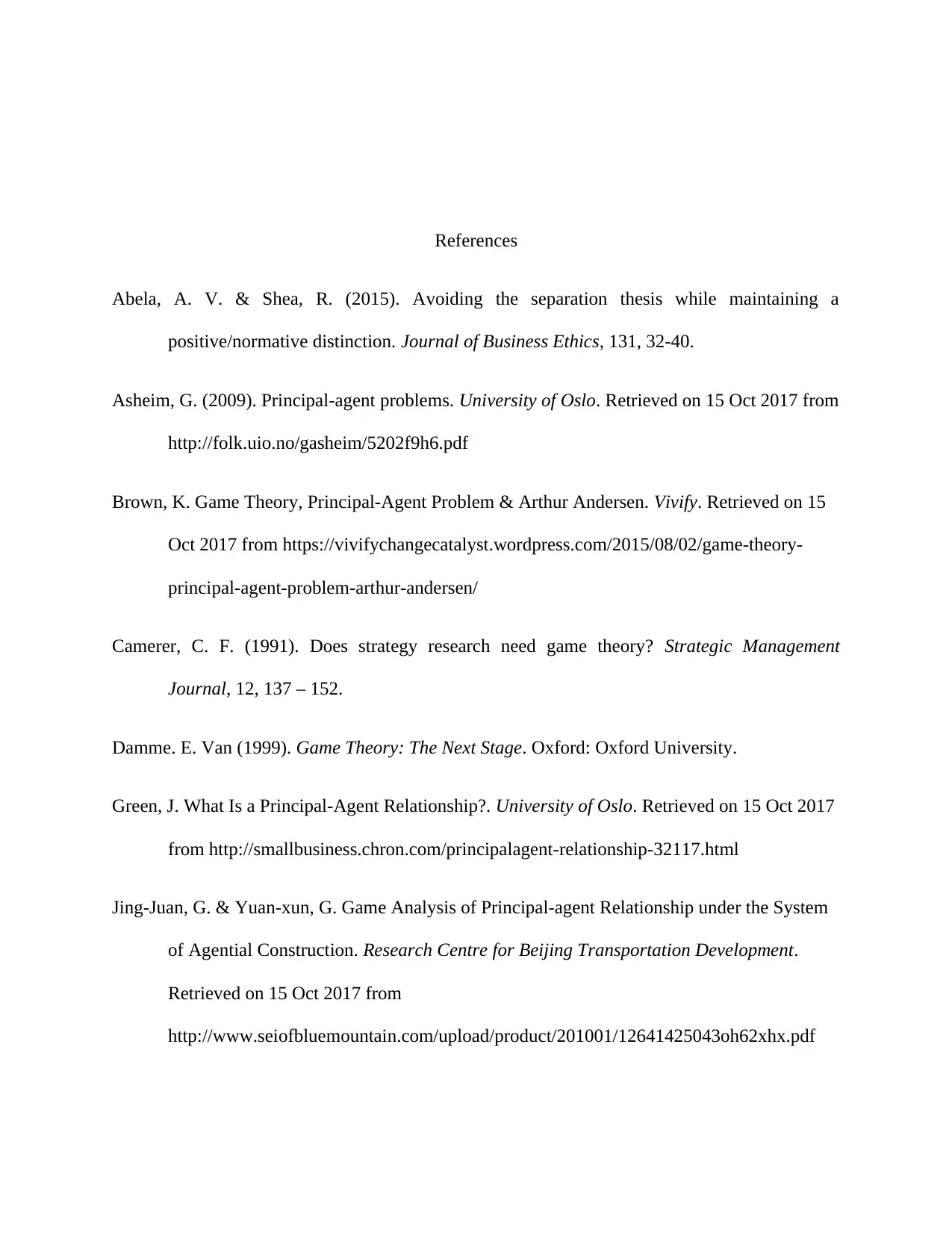
References
Abela, A. V. & Shea, R. (2015). Avoiding the separation thesis while maintaining a
positive/normative distinction. Journal of Business Ethics, 131, 32-40.
Asheim, G. (2009). Principal-agent problems. University of Oslo. Retrieved on 15 Oct 2017 from
http://folk.uio.no/gasheim/5202f9h6.pdf
Brown, K. Game Theory, Principal-Agent Problem & Arthur Andersen. Vivify. Retrieved on 15
Oct 2017 from https://vivifychangecatalyst.wordpress.com/2015/08/02/game-theory-
principal-agent-problem-arthur-andersen/
Camerer, C. F. (1991). Does strategy research need game theory? Strategic Management
Journal, 12, 137 – 152.
Damme. E. Van (1999). Game Theory: The Next Stage. Oxford: Oxford University.
Green, J. What Is a Principal-Agent Relationship?. University of Oslo. Retrieved on 15 Oct 2017
from http://smallbusiness.chron.com/principalagent-relationship-32117.html
Jing-Juan, G. & Yuan-xun, G. Game Analysis of Principal-agent Relationship under the System
of Agential Construction. Research Centre for Beijing Transportation Development.
Retrieved on 15 Oct 2017 from
http://www.seiofbluemountain.com/upload/product/201001/12641425043oh62xhx.pdf
Abela, A. V. & Shea, R. (2015). Avoiding the separation thesis while maintaining a
positive/normative distinction. Journal of Business Ethics, 131, 32-40.
Asheim, G. (2009). Principal-agent problems. University of Oslo. Retrieved on 15 Oct 2017 from
http://folk.uio.no/gasheim/5202f9h6.pdf
Brown, K. Game Theory, Principal-Agent Problem & Arthur Andersen. Vivify. Retrieved on 15
Oct 2017 from https://vivifychangecatalyst.wordpress.com/2015/08/02/game-theory-
principal-agent-problem-arthur-andersen/
Camerer, C. F. (1991). Does strategy research need game theory? Strategic Management
Journal, 12, 137 – 152.
Damme. E. Van (1999). Game Theory: The Next Stage. Oxford: Oxford University.
Green, J. What Is a Principal-Agent Relationship?. University of Oslo. Retrieved on 15 Oct 2017
from http://smallbusiness.chron.com/principalagent-relationship-32117.html
Jing-Juan, G. & Yuan-xun, G. Game Analysis of Principal-agent Relationship under the System
of Agential Construction. Research Centre for Beijing Transportation Development.
Retrieved on 15 Oct 2017 from
http://www.seiofbluemountain.com/upload/product/201001/12641425043oh62xhx.pdf
⊘ This is a preview!⊘
Do you want full access?
Subscribe today to unlock all pages.

Trusted by 1+ million students worldwide
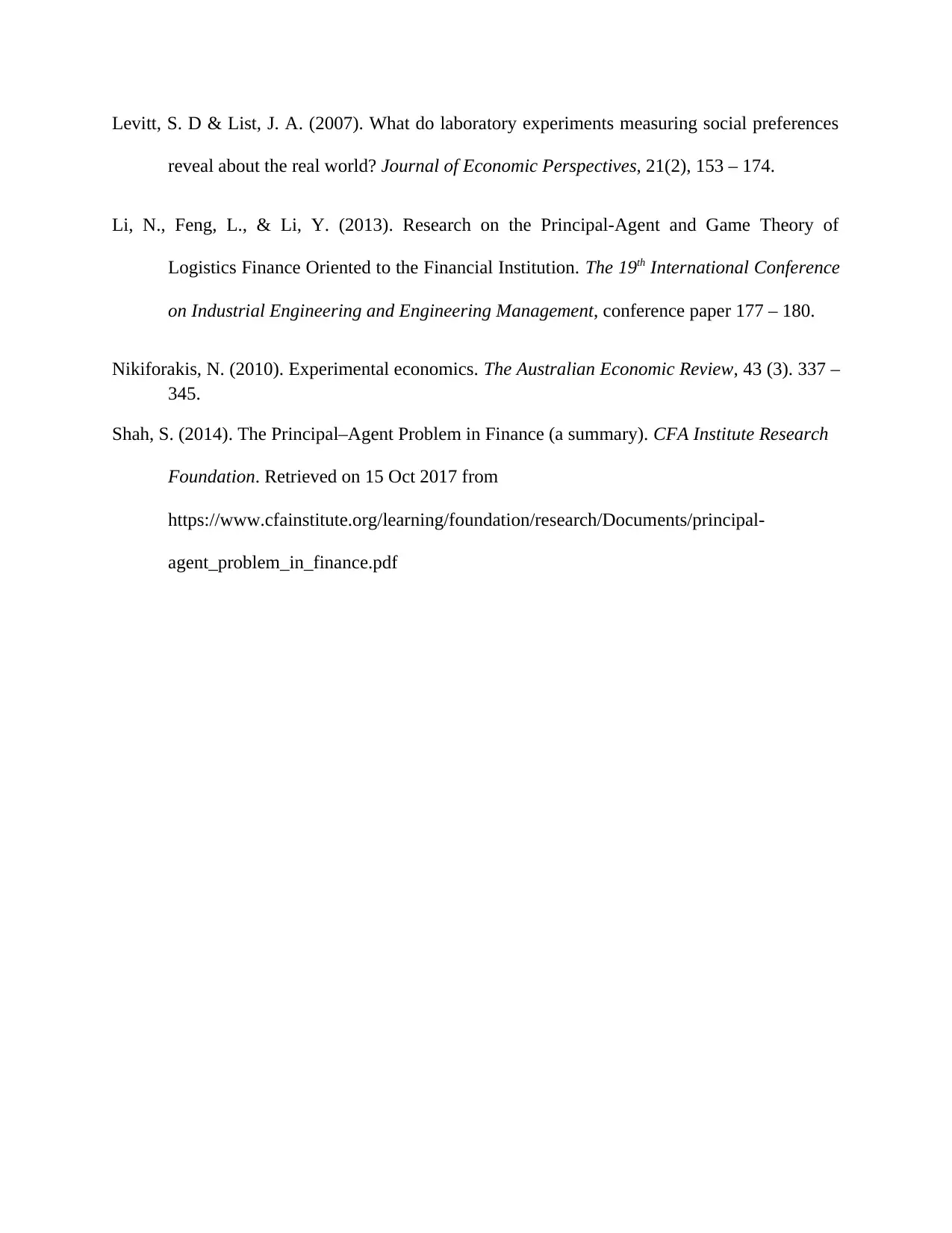
Levitt, S. D & List, J. A. (2007). What do laboratory experiments measuring social preferences
reveal about the real world? Journal of Economic Perspectives, 21(2), 153 – 174.
Li, N., Feng, L., & Li, Y. (2013). Research on the Principal-Agent and Game Theory of
Logistics Finance Oriented to the Financial Institution. The 19th International Conference
on Industrial Engineering and Engineering Management, conference paper 177 – 180.
Nikiforakis, N. (2010). Experimental economics. The Australian Economic Review, 43 (3). 337 –
345.
Shah, S. (2014). The Principal–Agent Problem in Finance (a summary). CFA Institute Research
Foundation. Retrieved on 15 Oct 2017 from
https://www.cfainstitute.org/learning/foundation/research/Documents/principal-
agent_problem_in_finance.pdf
reveal about the real world? Journal of Economic Perspectives, 21(2), 153 – 174.
Li, N., Feng, L., & Li, Y. (2013). Research on the Principal-Agent and Game Theory of
Logistics Finance Oriented to the Financial Institution. The 19th International Conference
on Industrial Engineering and Engineering Management, conference paper 177 – 180.
Nikiforakis, N. (2010). Experimental economics. The Australian Economic Review, 43 (3). 337 –
345.
Shah, S. (2014). The Principal–Agent Problem in Finance (a summary). CFA Institute Research
Foundation. Retrieved on 15 Oct 2017 from
https://www.cfainstitute.org/learning/foundation/research/Documents/principal-
agent_problem_in_finance.pdf
1 out of 7
Your All-in-One AI-Powered Toolkit for Academic Success.
+13062052269
info@desklib.com
Available 24*7 on WhatsApp / Email
![[object Object]](/_next/static/media/star-bottom.7253800d.svg)
Unlock your academic potential
Copyright © 2020–2025 A2Z Services. All Rights Reserved. Developed and managed by ZUCOL.